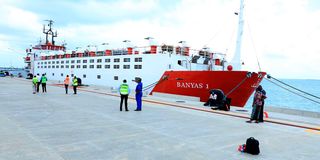Calls grow for Lamu Port to manage own business

Mv Banyas 1 Lome Vessel which docked at the Port of Lamu Berth Number 1 in this photo taken on October 15, 2022.
As newly appointed Kenya Ports Authority (KPA) Managing Director William Kipkemboi Ruto settles down to work, he’s taking office amid a growing clamour among locals for Lamu Port to have its own board of management.
A section of leaders in the county wants the management of Lamu Port delinked from the KPA board, which is in charge of the facilities across the country.
A counterpoint in the raging debate, however, is that the calls are being made too early without giving the port a chance to grow.
As part of the Sh2 trillion Lamu Port-South Sudan-Ethiopia Transport (Lapsset) Corridor Project, the facility is expected to open up the northern part of the country and contribute at least 1.5 per cent of Kenya’s Gross Domestic Product (GDP). Once fully operational, Lamu Port is expected to be one of the biggest in Africa, capable of receiving post-panamax vessels with a capacity of 19,000 TEUs (twenty-foot equivalent units) owing to its deep waters, allowing KPA to also benefit from the trans-shipment business.
Board of Management
Speaking in Mpeketoni while hosting President William Ruto three weeks ago, Lamu Governor Issa Timamy echoed calls for a Lamu Port board of management, saying, the KPA board was focused more on the port of Mombasa.
Speaking at a separate event, Nominated senator Shakila Abdalla said a board of management would “enable Lamu Port to stand on its own”.
Pwani University don Halimu Shauri said operational autonomy at the port would result in efficiency, timely decision-making and better marketing efforts.
Prof Shauri added that allowing the port to operate independently will infuse healthy competition with other ports in the region. Mr Stephen Oddiaga, a lawyer, pointed out, however, that establishment of a board of management for Lamu Port will require the enactment of a law to turn the facility into a parastatal.
“A board is a creation of the law. It will require a long legal process for it to be independent. For now, it is still part of KPA, just like other ports such as Shimoni and Kisumu,” said Mr Odiagga.
The port, the lawyer went on to say, is “still young” and needs to learn the operational ropes from Mombasa. His sentiments were echoed by Mr Philip Mbaji, a political commentator, who dismissed the idea as ill-advised.
“A board of directors is normally in charge of an entire parastatal not a section of it. In this case, the parastatal is KPA, whose board must oversee the operations of all the ports in the country,” said Mr Mbaji.





